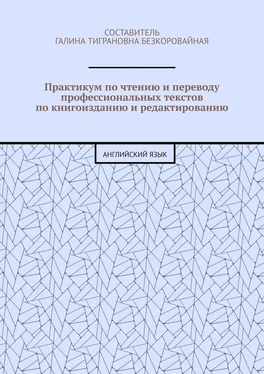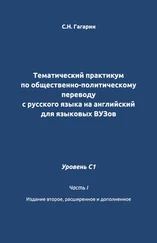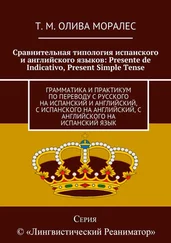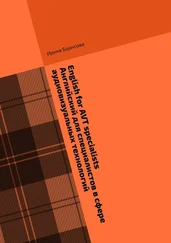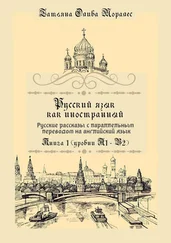Повествовательное документальное произведение; процесс написания книги автором; длившееся десятилетиями противостояние; захватывающий мир идей; самые слабые в стаде антилопы; аспект истории культуры; привлекательные абстрактные идеи; проходить красной нитью; может помочь невероятно (в огромной степени); пробиваться через; сложное построение сцены; искать только недостатки; шумиха больше нужна, чем сущность; на гуманитарном уровне; золото, которое он выкопал; найти в их книгах самое лучшее.
5. Answer the following questions:
1. How do you understand the statement: «To be a good editor, it helps to think like a writer.»? Do you agree with it and why?
2. What books were Matt and Morrissey editing? What problem did they meet while editing?
3. What can a scribble on the margins do for the author?
4. Is the editor to rewrite or just polish the writer’s work?
5. What do you think about being a good editor?
6. Do you think the writer benefits from a good editor and why?
7. What metaphors are used in this article?
6. Fill in the gaps with the words from the text:
1. It’s just as important for an editor to understand the __________ process as it is to understand the words on the page.
2. Like the Freud book, it’s narrative __________, the story of the decades-long rivalry between two of Italy’s great 17th- century architects, Gianlorenzo Bernini and Francesco Borromini.
3. The more of the Freud __________ I edited, the more I realized that Matt and I had grappled with the same challenges
4. When I thought a point was __________ or that Matt needed to be more specific – I once asked him to be «less psychiatric» – I said so.
5. And no matter which side of the desk I sit on, it helps to remember that all of these writers __________ from having an editor who helped them find the best books in them.
7. Translate into English:
1. Редактор пробивался через сложности повествования, пытаясь исправить стиль, ухватить и упростить основной смысл переведенного произведения.
2. Задача редактора состоит в том, чтобы лишь отшлифовать произведение автора, не искажая сути текста.
3. По мере того как он переводил роман, он постоянно помнил о том, что редактор иногда выискивает только недостатки.
4. Он с удовольствием прочел это документальное произведение, которое ему очень понравилось.
5. Что значит быть хорошим редактором?
6. Не стоит забывать, что после редактирования произведение должно звучать как у автора, а не нести в себе стиль редактора.
7. Быть хорошим редактором означает глубоко проникать в сущность повествования.
8. Speak out on the text subject using as many words from the text as possible.
1. Read and learn the following words and expressions:
1. Branch – отрасль
2. Appearance- появление
3. social consciousness-общественное сознание
4. genesis – происхождение, зарождение
5. along with- наряду с
6. expansion – распространение, расширение
7. destribution – распределение
8. to encounter-встретить, столкнуться с
9. rapidity -скорость
10. harsh sentences —суровые приговоры
11. secular-светский
12. to facilitate – облегчать
13. cylinder press-плоскопечатная машина
14. in accordance with- в соответствии с
15. contingent – доля, квота
16. bookselling-книгораспространение
17. artisan- ремесленник
18. handicraft – ручная работа
19. editorial – редакторский
20. scribes – писцы, секретари
21. fines —денежные штрафы
22. multivolume-многотомный
23. Cyrillic characters – буквы шрифта кириллица
24. annals-летописи
25. establishment- образование, основание
2. Read the text below:
http://encyclopedia2.thefreedictionary.com/Publishing+industry
PUBLISHING
Publishing is a branch of culture and production that involves the preparation, production, and distribution of books, magazines, newspapers, and graphic material. The level, scope, and orientation of publishing are determined by the material, sociopolitical, and cultural conditions of a society.
Book publishing existed for many centuries before the appearance of printing. As a means of expression of social consciousness, the manuscript book influenced the development and formation of ideas and knowledge; however, its sphere of influence was extremely limited. J. Gutenberg’s invention of the European method of printing (mid-15th century) opened up a new era in the history of books; the printed word became an important factor in social development.
The publishing house emerged as an enterprise for the production of printed matter in Europe in the 16th century. The genesis of publishing houses was integrally associated with the formation of capitalism. Printer-publishers emerged in the 16th and 17th centuries as a result of the expansion of printing houses, an increase in their output, the necessity for technical and especially financial provisions for production (given the lengthy cycle of publication for an individual book), and the need to organize the sale of books. The publishing activity of Aldo Manuzio (Venice) and C. Plantin (Antwerp), along with the families of Elsevier (the Netherlands) and Etienne and Didot (France), was of great significance. Publishers who did not have their own presses and gave the books they published to commercial firms appeared in the 18th century.
The development of publishing encountered considerable difficulties because of the hostile attitude of the feudal and church authorities toward the printing and distribution of secular books, which were a weapon of the bourgeoisie in the struggle against the feudal and clerical system. Publishing was contingent upon special permission; books, journals, and newspapers were subject to strict censorship. Taxes and duties were imposed upon publishing houses; they were punished by fines and shut down, and the owners of publishing enterprises and printing houses were brought to trial and given harsh sentences.
The victory of the bourgeois social system over feudalism in a number of European countries facilitated the development of publishing. From the 18th through the mid-19th century, the process of forming publishing houses and their quantitative growth in all countries proceeded with increasing rapidity. The functions and structure of publishing houses became considerably more complex. Editorial, bibliographical and informational, and advertising activity developed, as well as bookselling (in the «publishers’” book trade). In publishing generally, and in book production in particular, machine technology was rapidly introduced. The invention of machinery for paper manufacture in the late 18th century expanded and considerably improved paper production and made it cheaper; the appearance of the cylinder press in the early 19th century, as well as the invention of other typographic machines, considerably expanded the potential of typography. The process of specialization of publishing and typographic enterprises in the publishing business began in the mid-19th century, with the emergence of a new, strong technical base. As the period of monopoly capitalism began (the late 19th to early 20th century), there was massive organization of publishing houses on the model of joint-stock companies, and thereafter book and newspaper-magazine publishing houses were organized into trusts.
Читать дальше
